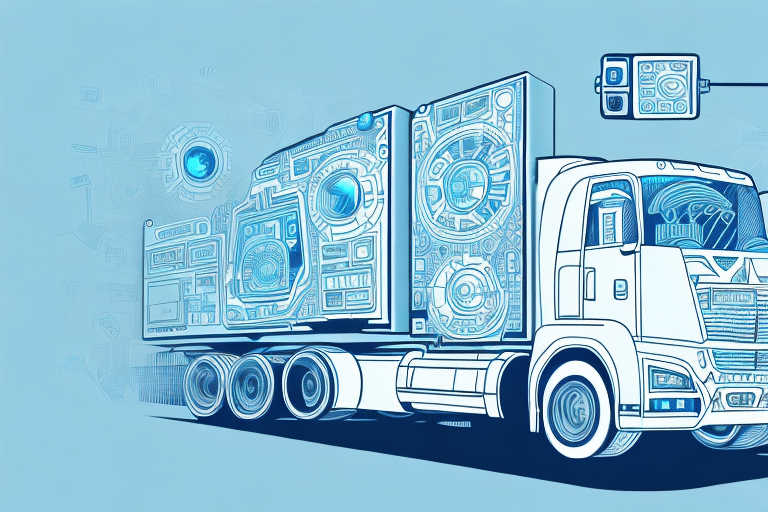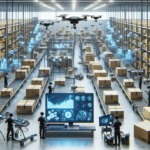Unlocking the Potential of Digital Freight: The Benefits of Automation
The shipping industry is undergoing a transformation, largely driven by digital freight technologies. The rise of automation in freight management has significantly enhanced the shipping process, resulting in cost savings, improved efficiency, and faster delivery times. In this article, we explore the benefits of digital freight and how automation is revolutionizing the supply chain process.
How Digital Freight is Revolutionizing the Shipping Industry
Digital freight technologies encompass cloud-based solutions, GPS tracking, RFID tags, and data analytics. By leveraging these tools, shippers can automate their supply chains, leading to greater speed, lower costs, and enhanced visibility into operations.
Real-Time Shipment Tracking
One of the most significant advantages of digital freight is the ability to track shipments in real-time. This capability allows shippers to know the exact location of their shipments at any moment, enabling adjustments to delivery schedules as needed. Real-time visibility is crucial for ensuring timely deliveries and accurate drop-off locations.
Reduction of Paperwork and Manual Processes
Digital freight eliminates the need for physical paperwork by storing all documentation electronically. This reduction in manual processes minimizes the risk of errors, accelerates processing times, and facilitates easier collaboration among different parties in the supply chain.
Route Optimization and Reduction of Empty Miles
By analyzing data on shipping patterns and demand, digital freight technologies help shippers optimize their routes and reduce empty miles. This not only saves on fuel costs and lowers emissions but also alleviates traffic congestion and enhances overall transportation efficiency.
The Rise of Automation in Freight Management: What You Need to Know
Automation in freight management involves using technology to enhance the efficiency and speed of the shipping process. Digital freight leverages tools such as robotics, machine learning, and artificial intelligence to achieve automation.
Process Automation
Automating processes like data entry, cargo loading, and unloading reduces the likelihood of errors and delays. Automation also aids in optimizing shipping routes, saving time and reducing fuel costs.
Enhanced Shipment Tracking
With sensors and GPS technology, automation provides real-time monitoring of shipment locations and conditions throughout the shipping process. This enhanced visibility allows for quicker responses to any issues or delays that may arise.
How Automation is Streamlining the Supply Chain Process
Digital freight technologies enable shippers to streamline their supply chain processes by automating tasks such as order fulfillment, inventory management, and warehouse operations. Automation reduces fulfillment times and ensures optimal inventory levels.
Warehouse Management
Automation in warehouses includes tasks like inventory tracking, order picking, and restocking. Advanced analytics optimize warehouse layouts, making order fulfillment more efficient and faster.
Increased Accuracy and Cost Savings
Automating tasks minimizes human error, ensuring accurate order fulfillment and precise inventory tracking. While initial investments in automation technologies are required, the long-term efficiency gains and cost savings from reduced labor and improved inventory management are substantial.
The Cost Savings of Implementing Digital Freight Technologies
Digital freight and automation offer significant cost savings by streamlining operations, reducing errors, and optimizing routes. Automating warehouse operations also lowers labor costs and enhances overall efficiency.
Enhanced Visibility and Tracking
Real-time tracking allows shippers to manage inventory more effectively, reducing the risk of lost or damaged goods. This improved visibility can lead to fewer insurance claims and lower insurance premiums, further decreasing costs for shippers.
How Automation is Improving Shipping Efficiency and Speed
Automation is pivotal in enhancing shipping efficiency and speed by minimizing the time required to complete tasks. This results in reduced shipping and delivery times, and ensures orders are fulfilled accurately and promptly.
Route Optimization
Automated systems help shippers optimize their routes, decreasing the time it takes to transport goods from one location to another. This leads to faster delivery times, higher customer satisfaction, and a more competitive shipping process.
Reduction of Human Error
Automated systems limit mistakes in tasks such as data entry, order processing, and inventory tracking, leading to fewer delays and errors in the shipping process. This improvement enhances customer satisfaction and loyalty.
The Role of Big Data in Digital Freight Management
Big data is essential in digital freight management, providing shippers with insights into delivery patterns, inventory levels, and shipping preferences. These insights enable optimization of operations, cost reduction, and improved speed and efficiency.
Advanced Analytics
Using advanced analytics tools, shippers gain deep insights into their supply chain operations, allowing for informed decision-making that ensures timely and accurate product delivery.
Risk Management
Big data helps identify potential risks and disruptions in the supply chain by analyzing factors like weather patterns and traffic congestion. This proactive approach allows shippers to adjust operations to avoid delays and minimize disruption impacts.
The Impact of Digital Freight on Logistics and Transportation
Digital freight has significantly impacted logistics and transportation by automating processes, reducing errors, and optimizing routes. This leads to cost reductions and improved delivery times. Additionally, real-time visibility enhances communication between shippers, carriers, and customers.
Enhanced Communication
Real-time visibility facilitates better communication among all stakeholders, ensuring that everyone is informed about shipment statuses and can respond promptly to any changes or issues.
Data-Driven Decision Making
Analyzing data from digital freight technologies allows shippers to identify trends and make data-driven decisions that enhance operational efficiency and reduce costs.
The Future of Freight Management: Predictions and Trends
The future of freight management is promising, with continuous technological advancements driving further benefits from digital freight. Emerging tools like blockchain technology and drone delivery are set to bring additional improvements to the shipping industry.
Sustainability Focus
There is an increasing emphasis on sustainability, with shippers aiming to reduce waste and adopt energy-efficient technologies. This not only minimizes environmental impact but also leads to cost savings.
Autonomous Vehicles
The rise of autonomous vehicles, including self-driving trucks and drones, is expected to enhance efficiency, reduce costs, and improve road safety as the technology becomes more widespread.
Overcoming Challenges in Implementing Digital Freight Solutions
Despite the numerous benefits, implementing digital freight solutions presents challenges such as the need for significant investment in technology and infrastructure. Additionally, ensuring the security and safety of shipments is crucial when utilizing digital freight solutions.
Investment in Technology
Shippers must invest in reliable and secure technologies to effectively implement digital freight solutions. Partnering with experienced providers can help mitigate initial investment challenges.
Ensuring Security and Safety
Maintaining the security and safety of shipments requires robust digital freight solutions. Shippers should work with trusted partners and adopt best practices to safeguard their shipments throughout the delivery process.
Maximizing the Potential of Automation for Your Business
To fully harness the benefits of digital freight and automation, shippers need to invest in new technologies and infrastructure. Embracing real-time tracking and communication is essential for staying competitive and enhancing customer satisfaction.
Partnering with Experts
Collaborating with experienced partners ensures the successful implementation of automation technologies and helps shippers stay ahead of the competition.
Investing in Reliable Technology
Reliable technology is the backbone of effective automation. Shippers must prioritize investments in tools that offer dependability and facilitate efficient operations.
The Benefits of Real-Time Tracking and Visibility in Digital Freight Management
Real-time tracking and visibility are vital for ensuring timely deliveries and accurate shipment locations. Digital freight enables shippers to monitor shipments in real-time, allowing for necessary adjustments to delivery schedules.
Route Optimization
Real-time tracking aids in optimizing routes, reducing delivery times, and enhancing operational efficiency. This ensures that shipments are transported using the most efficient paths.
Enhanced Supply Chain Management
Providing real-time visibility into the supply chain process allows shippers to maintain efficient operations and quickly address any issues that arise.
Case Studies: Successful Implementation of Digital Freight Technologies
Numerous examples demonstrate the successful implementation of digital freight technologies. For instance, the use of RFID tags in inventory management enables accurate tracking of inventory levels, minimizing stockouts and optimizing ordering processes.
Another example is GPS tracking in the shipping process, which allows shippers to optimize routes, resulting in faster delivery times and reduced costs. These case studies highlight the tangible benefits of adopting digital freight technologies.
Navigating Regulatory Compliance in a Digitally Automated World
Regulatory compliance is essential for ensuring that shippers adhere to industry standards and maintain the safety and security of their shipments. The adoption of digital freight technologies introduces new regulatory challenges that must be addressed.
Staying Informed on Regulations
Shippers must stay updated on industry regulations and standards to ensure compliance. This involves continuous monitoring of regulatory changes and adapting operations accordingly.
Working with Trusted Partners
Collaborating with experienced partners helps shippers navigate regulatory complexities and implement compliant digital freight solutions effectively.
Conclusion
Digital freight and automation are revolutionizing the shipping industry by optimizing supply chain processes, reducing costs, and enhancing efficiency and speed. From real-time tracking and visibility to advanced analytics and automation tools, digital freight is transforming how shippers conduct business. As technology continues to advance, shippers can anticipate even greater benefits from these innovations in the coming years.



















